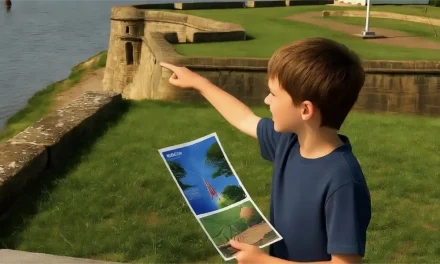
Rooting Curious Habits: Reward Their Efforts
A
child’s effort to understand the world is often more important than the answer they reach. Watching puddles form, turning a screw, figuring out a sound—these are moments of quiet persistence. When they try, notice it. Celebrate the process, not the result: “You really thought that through,” or “Great observation.” Whether their guess is right or wild, it’s the reaching that matters. Your encouragement teaches them that curiosity thrives on effort—not just insight—and that discovery often begins with a willingness to wrestle with uncertainty.
One morning, my son decided to fix a loose knob on the kitchen drawer. I watched for a moment, then said, “That looks tricky—what do you think’s going on with it?” He guessed it was a screw, tightened it, and smiled. “Nice—what made you try that?” I asked. That small fix turned into something more. He began tinkering around the house, poking at drawers and testing devices. Every time we praised the trying—whether it worked or not—his drive grew stronger. Over time, curiosity became action. He learned that effort could be its own adventure, one that moved him forward even when the outcome stayed unknown.
Support this mindset by giving their effort a place to continue. If they wrestle with a question—big or small—circle back later: “What’s changed since you first tried that?” Bring up an unfinished idea at dinner, or return to a half-finished project over the weekend. They might rebuild a block tower, redesign a drawing, or take another crack at a broken object. You don’t need to track every attempt—just stay present with the process. That presence sends a quiet message: effort matters, even when the answer doesn’t come right away.
Rooting Curious Habits

Rooting Curious Habits: Ignite Their Dreams
Support children’s ambitions with encouragement and curiosity. Big dreams inspire confidence, direction, and meaningful purpose.

Rooting Curious Habits: Share Your Whys
Let children hear your own questions and reasoning. Modeling curiosity shows that learning is lifelong and open-ended.

Rooting Curious Habits: Create Curious Moments
Small discoveries ignite big curiosity. Create moments of wonder in your children’s everyday life to spark imagination and joyful learning.
Table of contents

Primordial Soup for the Mind: Navigation
Navigate the book Primordial Soup for the Mind.
TIPS
- Praise persistence to fuel momentum.
- Point out what took work, even if it didn’t work out.
- Stay present with their unfinished work.
ACTIVITIES
- Fix-It Try: Help fix something together, notice their effort—10–15 min
- Idea Revisit: Return to a past puzzle or project and ask what’s changed—10–15 min
- Effort Replay: Act out or re-try a tricky moment together—change a step, see what’s different (15–20 min)
TOOLS
Effort Journal, Try Chart

Download “Primordial Soup for the Mind: A Parent’s Guide to Nurturing Intellectual Growth”
Enter your information to get this article and hundreds more as part of the FREE book Primordial Soup for the Mind.
Share your thoughts with the Thought Academy community in the Comments section below.

Sharpen those skills!
Enter your information to get our FREE practice exercises so you can hone your critical thinking and reasoning skills!







0 Comments